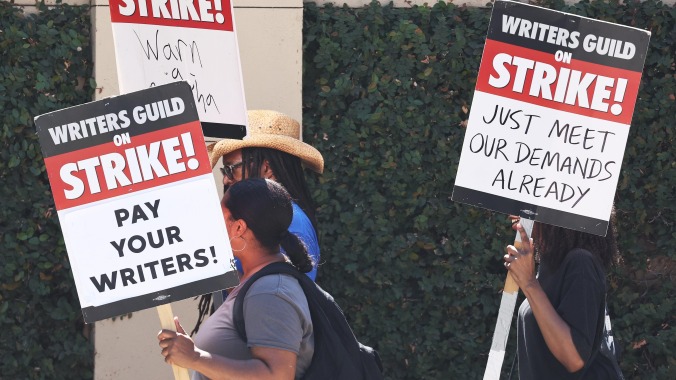Introducing Endless Mode: A New Games & Anime Site from Paste
Writers Guild of America members and supporters on the picket line Photo: Mario Tama
After more than 100 days of the Writers Guild of America strike, the last two weeks saw a small glimmer of hope that the union could come to a resolution with the Alliance of Motion Picture and Television Producers as negotiators for both sides met for the first time since the original contract expired. Unfortunately, the latest round of discussions hasn’t proven fruitful, as the AMPTP has only produced a single counteroffer and isn’t willing to negotiate it further, according to the WGA.
“On Monday of this week, we received an invitation to meet with Bob Iger [of Disney], Donna Langley [of Universal Pictures], Ted Sarandos [of Netflix], David Zaslav [of Warner Bros. Discovery], and Carol Lombardini [AMPTP’s president]. It was accompanied by a message that it was past time to end this strike and that the companies were finally ready to bargain a deal,” the guild said in a message sent to membership on Tuesday. “We accepted that invitation and, in good faith, met tonight, in hopes that the companies were serious about getting the industry back to work. Instead, on the 113th day of the strike—and while SAG-AFTRA is walking the picket lines by our side—we were met with a lecture about how good their single and only counteroffer was.”
Per The Hollywood Reporter, the studios’ counter offer involved barring A.I. generated writing from being considered “literary material” as well as additional “guardrails” on A.I. material; quarterly reports on streaming viewership numbers; a 10-week minimum employment “on high-budget SVOD and Pay TV series ‘development rooms’”; an increase on streaming residuals and a wage rate increase to match the recently negotiated Directors Guild of America contract.
“We explained all the ways in which their counter’s limitations and loopholes and omissions failed to sufficiently protect writers from the existential threats that caused us to strike in the first place. We told them that a strike has a price, and that price is an answer to all—and not just some—of the problems they have created in the business,” stated the WGA. The union has championed, among other things, a minimum staff for writers’ rooms, a proposal they say went largely ignored in the AMPTP’s counteroffer. “But this wasn’t a meeting to make a deal. This was a meeting to get us to cave, which is why, not twenty minutes after we left the meeting, the AMPTP released its summary of their proposals. This was the companies’ plan from the beginning—not to bargain, but to jam us. It is their only strategy—to bet that we will turn on each other.”
The missive ended with a rallying cry to meet on the picket lines and “let the companies continue to see what labor power looks like.” Meanwhile, Lombardini gave what THR characterizes as a “rare” statement saying, “Our priority is to end the strike so that valued members of the creative community can return to what they do best and to end the hardships that so many people and businesses that service the industry are experiencing.”
In the view of the AMPTP, the studios’ counteroffer “meets the priority concerns the writers have expressed,” despite the fact that the writers are saying otherwise. Lombardini professes that the AMPTP is “deeply committed to ending the strike and are hopeful that the WGA will work toward the same resolution.”
Unfortunately for the wealthy studio executives, the WGA is working towards a resolution in which its membership are treated fairly and with the dignity they deserve, not simply a resolution that ends the strike. Hopefully, they can come to an agreement that accomplishes both. Until then, it doesn’t look like the WGA is giving up any time soon.
